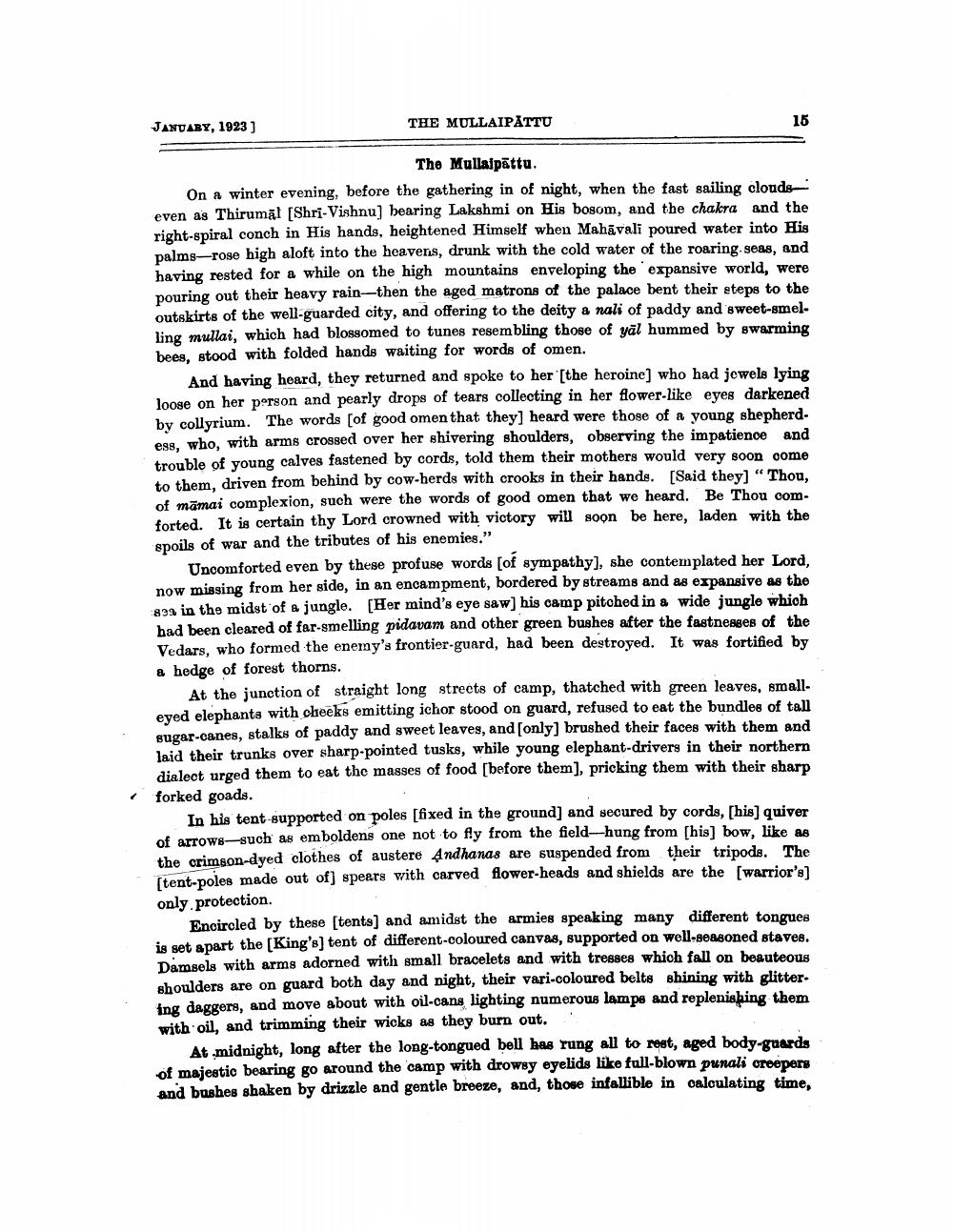________________
JANUABY, 1923)
THE MULLAIPATTU
The Mullaipāttu. On a winter evening, before the gathering in of night, when the fast sailing clouds even as Thirumal (Shri-Vishnu) bearing Lakshmi on His bogom, and the chakra and the right-spiral conch in His hands, heightened Himself when Mahāvali poured water into His palms-rose high aloft into the heavens, drunk with the cold water of the roaring seas, and having rested for a while on the high mountains enveloping the expansive world, were pouring out their heavy rain--then the aged matrons of the palace bent their steps to the outskirts of the well-guarded city, and offering to the deity a nali of paddy and sweet-emel. ling mullai, which had blossomed to tunes resembling those of yāl hummed by swarming bees, stood with folded hands waiting for words of omen.
And having heard, they returned and spoke to her (the heroine) who had jewels lying loose on her person and pearly drops of tears collecting in her flower-like eyes darkened by collyrium. The words (of good omen that they] heard were those of a young shepherd. ess, who, with arms crossed over her shivering shoulders, observing the impatience and trouble of young calves fastened by cords, told them their mothers would very soon come to them, driven from behind by cow-herds with crooks in their hands. [Said they] “Thou, of māmai complexion, such were the words of good omen that we heard. Be Thou com forted. It is certain thy Lord crowned with victory will soon be here, laden with the spoils of war and the tributes of his enemies."
Uncomforted even by these profuse words (of sympathy], she contemplated her Lord, now missing from her side, in an encampment, bordered by streams and as expansive as the sea in the midst of a jungle. (Her mind's eye saw) his camp pitched in a wide jungle which had been cleared of far-smelling pidavam and other green bushes after the fastnenges of the Vedars, who formed the enemy's frontier-guard, had been destroyed. It was fortified by a hedge of forest thorns.
At the junction of straight long strects of camp, thatched with green leaves, smalleyed elephants with cheeks emitting ichor stood on guard, refused to eat the bundles of tall sugar-canes, stalks of paddy and sweet leaves, and [only] brushed their faces with them and laid their trunks over sharp-pointed tusks, while young elephant-drivers in their northern dialect urged them to eat the masses of food [before them), pricking them with their sharp forked goads.
In his tent supported on poles (fixed in the ground) and secured by cords, [his) quiver of arrowe-such as em boldens one not to fly from the field-hung from shis) bow. like as the crimson-dyed clothes of austere Andhanas are suspended from their tripods. The [tent-poles made out of} spears with carved flower-heads and shields are the warrior's] only.protection.
Encircled by these [tents) and amidst the armies speaking many different tongues is set apart the [King's) tent of different coloured canvas, supported on well-seasoned staves. Damsels with arms adorned with small bracelets and with tresses which fall on beauteous shoulders are on guard both day and night, their vari-coloured belts shining with glitter ing daggers, and move about with oil-cans lighting numerous lamps and replenishing them with oil, and trimming their wicks as they burn out.
At.midnight, long after the long-tongued bell has rung all to rest, aged body-guards of majestic bearing go around the camp with drowsy eyelids like full-blown punali creepers and bushes shaken by drizzle and gentle breeze, and, those infallible in calculating time,




